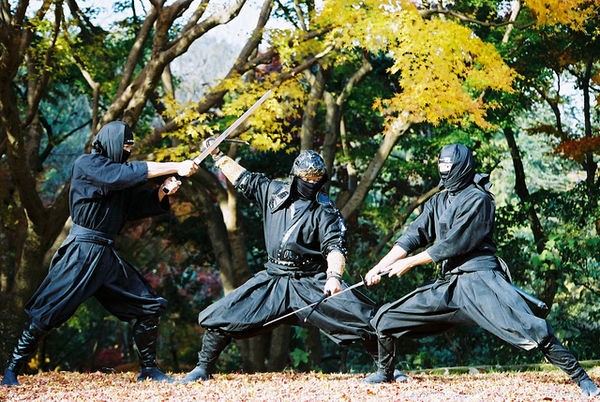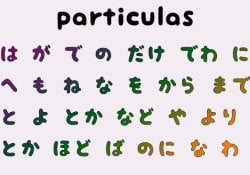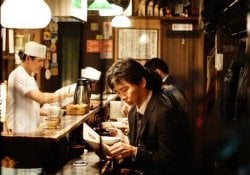In this article, we are going to share a complete list of Japanese proverbs known in Japan as Kotowaza. The famous Ninja phrases, famous for saying little, but speaking the truth.
The word referring to proverbs in Japanese is written as kotowaza [谚], which, besides proverb, can also mean saying, aphorism, and quotation. Japanese proverbs often do not make much sense because Japanese grammar is very simple.
To understand a Kotowaza, it is necessary to delve into the meaning of the ideograms presented in the sentence. I will try to explain in detail each Japanese proverb and also quote a similar saying in English.
We also recommend reading:
- Ichariba Choode - The union in Okinawa sayings
- Love in Japanese + 50 ways to say I love you
- Seisho no shomei – Japanese Bible Books
List of Japanese Proverbs - Kotowaza
毒を食らわば皿まで
Doku wo kurawaba sara made
- Literally: Se comer veneno, coma o prato;
- Note: It doesn't mean you should literally eat the plate, just lick it. 食らわ é uma expressão forte e violenta para se alimentar;
- Meaning: It means that if you are going to do something dangerous, take a risk, do it completely;
見ぬが花
Minu ga hana
- Literally: Não vendo é uma flor;
- Meaning: A realidade não pode competir com a imaginação. Às vezes você imagina coisas sem ver a realidade dela;
案ずるより産むが易し.
Anzuru yori umu ga yasashi
- Literally: Dar à luz a um bebê é mais fácil do que se preocupar com isso;
- Meaning: Medo é maior do que o perigo. Uma tentativa às vezes é mais fácil do que a gente espera. Muitos ficam com medo atoa, esse é o maior Inimigo;
バカは 死ななきゃ 治らない
Baka wa shinanakya naoranai
- Literally: Apenas a morte cura um idiota;
- Meaning: Não há nenhuma cura para a estupidez;

出る杭は打たれる
Deru kui wa utareru
- Literally: The nail that sticks up is hammered down;
- Meaning: If you stand out, you will be subject to criticism;
秋茄子は嫁に食わすな
Akinasu wa yome ni kuwasuna
- Literally: Não deixe que sua enteada coma suas berinjelas;
- Meaning: Não se deixe ser aproveitado;
残り物には福がある
Nokorimono ni wa fuku ga aru
- Literally: A Sorte existe nas sobras. / Há uma fortuna para as sobras;
- Meaning: Está guardando o melhor para o final. Só porque esta para traz não significa que é ruim. É muitas vezes usado para confortar as pessoas e ajudar elas a se esforçarem;
虎穴に入らずんば 虎子 を 得ず
Koketsu ni irazunba koji o ezu
- Literally: If you don't enter the tiger's cave, you can't get your cub;
- Meaning: Tome um risco para ser bem sucedido. Quem não arrisca, não petisca. Nada se consegue sem esforço;
さるも木から落ちる
Saru mo ki kara ochiru
- Literally: The Monkey also falls from the tree
- Meaning: Mesmo um especialista pode vir a errar;
泣いて暮らすも一生、笑って暮らすも一生
Naite kurasu mo issho, waratte kurasu mo issho
- Literally: Mesmo viver a vida a chorar, mesmo viver a vida rindo;
- Meaning: Life is the same whether you are happy or sad;
蓼食う虫も好き好き
Tade kuu mushi mo sukizuki
- Literally: Insects that eat the afternoon(uma erva daninha) também é por questão de gosto;
- Meaning: Gosto não se discute;
井の中の蛙大海を知らず
I no naka no kawazu taikai o shirazu
- Literally: O sapo do poço não conhece o oceano;
- Meaning: Só se sabe de algo, conhecendo ou vivenciando. Perfeito para aqueles que criticam outros países sem conhecer;
鳶が鷹を生む
Tonbi ga taka o umu
- Literally: From a parrot a hawk is born
- Meaning: Ordinary parents can have extraordinary children.
郷に入りては郷に従え
Gou ni itte wa, gou ni shitagae
- Literally: When entering the village, obey those who live in it;
- Meaning: No Japão seja Japonês;
- Equivalent: Dance conforme a música;
頭隠して尻隠さず
Atama kakushite, shiri kakusazu
- Literally: Esconde a cabeça mas não cobre o rabo;
- Meaning: Você resolve os problemas parcialmente. Não tem como fugir numa mentira;
花よりだんご
Hana yori dango
- Literally: Antes de flores, comida;
- Meaning: Praticidade;
- Faz um sentido, a pessoa vai a um festival Hanami, e ao invés de olhas as flores vai comer doces nas barraquinhas;
悪妻は百年の不作
Akusai wa hyaku-nen no fusaku
- Literally: A bad wife spoils the harvest for a hundred years;
- Meaning: O sucesso de um homem depende de sua esposa;
かえるの子はかえる
Kaeru no ko wa kaeru.
- Literally: O filhote do sapo é sapo;
- Equivalent: Filho de peixe, peixinho é;
覆水盆に帰らず
Fukusui bon ni kaerazu
- Literally: Spilled water does not return to the bowl.
Meaning: Nada será como antes. Não adianta chorar pelo leite derramado;
二兎を追う者は一兎をも得ず
Ni usagi wo ou mono wa ichi usagi wo mo ezu
- Literally: Se perseguir duas lebres, acaba sem nenhuma;
- Equivalent: Quem tudo quer, nada tem;
継続は力なり
Keizoku wa chikara nari.
- Literally: Perseverança traz poder;
猫に小判
Neko ni koban
- Literally: Pérola ao gato;
- Equivalent: Pérolas aos porcos;
雨降って地固まる
Ame futte chi katamaru
- Literally: A chuva deixa a terra endurecida;
- Meaning: Adversidade nos deixa forte. Equivalente: O que não mata engorda. O que não mata, fortalece;
馬鹿があって力行が引き立つ
Baka ga atte rikkō ga hikitatsu
- Literally: Power excels when among fools;
- Meaning: A presença de tolos ressalta a dos inteligentes;
馬鹿も一芸
Baka mo ichi gei
- Literally: Os tolos também tem talento;
- Meaning: Não subestimar nem os burros;
悪に強ければ善にも強
Aku ni tsuyokereba zen ni mo tsuyoshi
- Literally: O empenho [empregado] em se fazer o mal é o mesmo que pode fazer bem;
- Meaning: A mesma perseverança em fazer mal pode ser usada para fazer o bem. Um inimigo forte pode se tornar um amigo na mesma intensidade;
金は火で試み人は酒で試む
Kane wa hi de kokoromi, hito wa sake de kokoromu
- Literally: Gold is tested by fire, people by alcohol;
- Meaning: Talks about the superstition that drunkenness reveals the true face of people;
相手のない喧嘩はできぬ
Aite no nai kenka wa dekinu
- Literally: Não se pode brigar sozinho;
- Meaning: Quando um não quer, dois não brigam;
悪事千里をはしる
Akuji senri o hashiru
- LiterallyEvil is fast;
- EquivalentThe bad news arrives quickly. Gossip too.
朝起きは七つの得あり
Asaoki wa nanatsu no toku ari
- Literally: Get up early has seven advantages;
- EquivalentGod helps those who wake up early.
明日は明日、今日は今日
Ashita wa ashita, kyo wa kyou
- Literally: Tomorrow is tomorrow, today is today
- MeaningOne day at a time. Don't overthink about tomorrow.
痘痕も笑窪
Abata mo ekubo
- Literally: Warts/pimples turn into dimples
- Equivalent: Love is blind
一を聞いて十を知る
Ichi o kiite, juu o shiru
- Literally: Hear once, understand ten times
- EquivalentFor a good listener, one word is enough;
家ほどいい所ない
Uchi hodo ii tokoro nai
- Literally: There is no better place than our home
- Equivalent: Home Sweet Home
海のことは漁夫に問え
Umi no koto wa gyofu ni to e
- Literally: Ask the fisherman about the sea
- Meaning: ask people about something they master;
男心と秋の空
Otokogokoro to aki no sora
- Literally: Man's mind changes like the autumn sky;
- MeaningMen are fickle;
男は知恵、女は情け
Otoko wa chie, onna wa nasake
- LiterallyThe man has wisdom, the woman, compassion;
Videos about Japanese Proverbs
If you liked the proverbs, you can take a look at the great videos below, teaching the pronunciation and explaining more about the meaning of some Japanese proverbs.



